How do you ensure that you are serving as a role model for clients and demonstrating effective coping techniques and self-help strategies?
JUNIOR LEVEL

Sample answer to the question:
To ensure I am serving as a role model for clients and demonstrating effective coping techniques and self-help strategies, I prioritize my own self-care and personal growth. I regularly engage in activities that promote my own mental health and well-being, such as practicing mindfulness, exercising, and seeking support from my own network. By taking care of myself, I can show clients that self-care is essential. Additionally, I stay up-to-date with the latest research and best practices in the field of mental health and recovery. This allows me to provide accurate information and evidence-based strategies to clients. Lastly, I actively listen to clients, validate their experiences, and empower them to explore their own coping techniques and self-help strategies. By being a compassionate and empathetic listener, I create a safe space for clients to share their challenges and learn from one another.
Here is a more solid answer:
To ensure I am serving as a role model for clients and demonstrating effective coping techniques and self-help strategies, I prioritize my own self-care and personal growth. For example, I engage in regular therapy sessions and participate in support groups to continuously learn and grow. By sharing my journey of recovery and highlighting the coping strategies that have worked for me, I can inspire and encourage clients to explore their own self-help strategies. I also actively keep up with the latest research and attend workshops and conferences to stay updated on the best practices in recovery processes and wellness strategies. Furthermore, I facilitate group sessions and workshops where clients can learn and practice various coping techniques and self-help strategies together. By creating a collaborative and supportive environment, clients feel empowered to share their experiences and learn from one another.
Why is this a more solid answer?
The solid answer expands upon the basic answer by providing specific examples and details to support each point. It demonstrates the candidate's understanding of the job responsibilities and the importance of personal growth and continuous learning. However, the answer could be improved by further discussing the candidate's interpersonal skills and ability to relate to others' experiences.
An example of a exceptional answer:
To ensure I am serving as a role model for clients and demonstrating effective coping techniques and self-help strategies, I approach the role with empathy, authenticity, and a genuine passion for helping others. I understand the importance of building a strong rapport with clients, and I actively listen to their experiences without judgment. By sharing my own recovery journey, including the challenges I faced and the coping techniques I utilized, I can create a sense of relatability and inspire hope. I also adapt my communication style to meet the unique needs of each individual, recognizing that effective support looks different for everyone. Additionally, I continually enhance my knowledge of recovery processes and wellness strategies by seeking out training opportunities and engaging in ongoing professional development. This enables me to provide evidence-based strategies and stay up-to-date with the latest research. Lastly, I collaborate with clients to co-create personalized recovery plans, empowering them to take ownership of their wellness journey and tailor coping techniques to their specific needs and strengths.
Why is this an exceptional answer?
The exceptional answer goes beyond the solid answer by emphasizing the candidate's empathy, authenticity, and passion for helping others. It highlights the candidate's ability to adapt their communication style and collaborate with clients to personalize their recovery plans. The answer also emphasizes the candidate's commitment to ongoing professional development to provide the best support possible. This demonstrates a strong alignment with the job description and evaluation areas.
How to prepare for this question:
- Reflect on your own recovery journey and identify the coping techniques and self-help strategies that have worked for you. Be ready to share specific examples with the interviewer.
- Educate yourself on the latest research and best practices in recovery processes and wellness strategies. Familiarize yourself with evidence-based techniques that you can discuss during the interview.
- Practice active listening skills and validate the experiences of others. Showcase your ability to create a non-judgmental and supportive environment for clients.
- Highlight any experiences you have had facilitating groups or workshops. Discuss the topics covered and the strategies used to engage participants.
What are interviewers evaluating with this question?
- Strong interpersonal and communication skills
- Empathy and ability to relate to others' experiences
- Basic understanding of recovery processes and wellness strategies
- Ability to facilitate groups and work collaboratively

